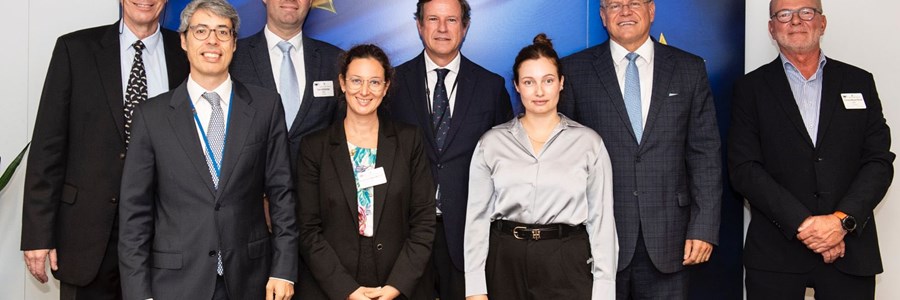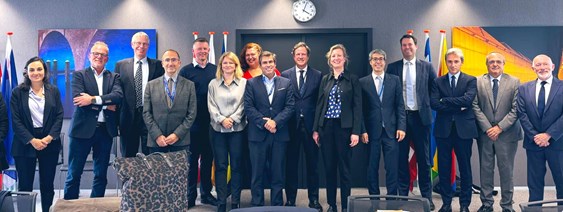Europêche meets Executive Vice President Sefcovic and Member States to discuss pressing fisheries issues

Europêche, the leading European organization representing the fishing industry, held high-level meetings yesterday with Executive Vice President Maroš Šefčovič and Member States’ officials. These meetings were a timely opportunity to discuss several critical matters for the European fisheries sector, amid the ongoing period of political transition within the EU.
Strengthening fisheries within the Trade portfolio
The President of Europêche opened the meeting by congratulating Vice President Šefčovič on his nomination as Commissioner-Designate for Trade, Economic Security, Interinstitutional Relations and Transparency and expressed eagerness for close collaboration under his new portfolio. Europêche emphasized the need to elevate fisheries and food production on the Commission's agenda, including trade. This holistic approach is crucial to enhance a resilient, sustainable and competitive sector in the global market. Europêche also called for trade reciprocity, mirror clauses and aligned standards in global markets, underscoring the importance of fair competition and a level playing field.
EU-Norway fisheries high-level dialogue
The discussion also touched on the EU's newly created high-level dialogue with Norway, with Europêche expressing appreciation for the Commission’s inclusion of fisheries in broader diplomatic talks. Both sides took stock of the situation and will closely monitor Norway’s actions in the coming months. Yet, Europêche encouraged the Commission to take a firm stance against the uncooperative and irresponsible practices from Norway, including the unilateral setting of excessive mackerel quotas and cod quota grabs. The sector therefore welcomed the Commission’s legislative proposal[1] that will better enable the EU to take more concrete measures against unsustainable fishing practices by non-EU countries and reinforce the process of cooperation.
EU position for the ICCAT annual meeting 2024
Europêche appreciated the Commission’s efforts in defending European quotas for tropical tunas but raised concerns over the growing gap in the level playing field between European and the others, deeply affecting their competitiveness in the Atlantic Ocean. Vessels under non-EU ownership are either not required to abide by, either fail to respect the temporary closure (FAD moratorium), exacerbating the challenges faced by European purse seiners. In this context, and given the fact that tuna stocks are in good health, Europêche called for the deletion or reduction of the FAD moratorium to one month to prevent the collapse of the EU purse seine fleet, which vessels and catches have already plunged by 40% since 2016.
Balanced fishing opportunities for 2025
Europêche acknowledged the significant progress toward more sustainable fisheries in the EU, particularly in the Northeast Atlantic, reported by the European Commission[2]. However, the Commission’s positive outlook is not translating into higher quotas. In the sector’s view, the Commission’s interpretation of scientific advice remains overly precautionary, cutting quotas in excess, and does not align with fishers’ observations at sea. Europêche called for improved scientific quality assurance and a balanced approach considering socio-economic factors and food security.
Concerns over drastic quota cuts
Under the new Commission’s political programme, putting the emphasis on food sovereignty, resilience and competitiveness, Europêche expected more balanced proposals for fishing opportunities. However, the sector is expressing great concern and disappointment over the heavy cuts proposed for many species, including anchovies in Iberian waters. The sector called on the Commission for more flexibility and a 10% increase for cod stocks in the North Sea.
The meeting also addressed ongoing challenges in the Mediterranean. Europêche highlighted the negative socio-economic impact of the dedicated multiannual plan, namely a whopping 40% reduction in fishing days, area closures and gear restrictions in the last four years. Europêche requested a full evaluation of the measures before taking further drastic reductions.
As regards the Baltic, Europêche representatives stressed that further reductions in bycatch quotas appear to be more symbolic than effective, as current quotas are already minimal. Instead, the focus must be on improving scientific data and addressing the environmental issues affecting these ecosystems.

Javier Garat, President of Europêche, concluded: ‘We see this new legislative term as a window of opportunity or an 'era of hope,' given that both the Commission’s structure and mandate prioritize food production and sovereignty. That said, we are disappointed by recent decisions regarding anchovy quotas and the Parliament's refusal to revise and introduce greater flexibility into fisheries multiannual plans. We expect words to be swiftly followed by action, ensuring a viable future for our fishers. Europêche remains committed to working closely with all European institutions to enhance the sustainability of our fisheries, including the socio and economic dimensions.’
Press contacts:
Daniel Voces, Managing Director of Europêche: +32 489 26 81 07 daniel.voces@europeche.org
Anne-France Mattlet, Deputy Managing Director of Europêche: +33 678 11 63 01
anne-france.mattlet@europeche.org
[1] https://europeche.chil.me/attachment/2ffe57b9-817c-4054-b23f-1c6d02cc187d
[2] Communication COM(2024) 235
Sources: Europeche
Tags: Sefcovic, presidency, Council, fisheries